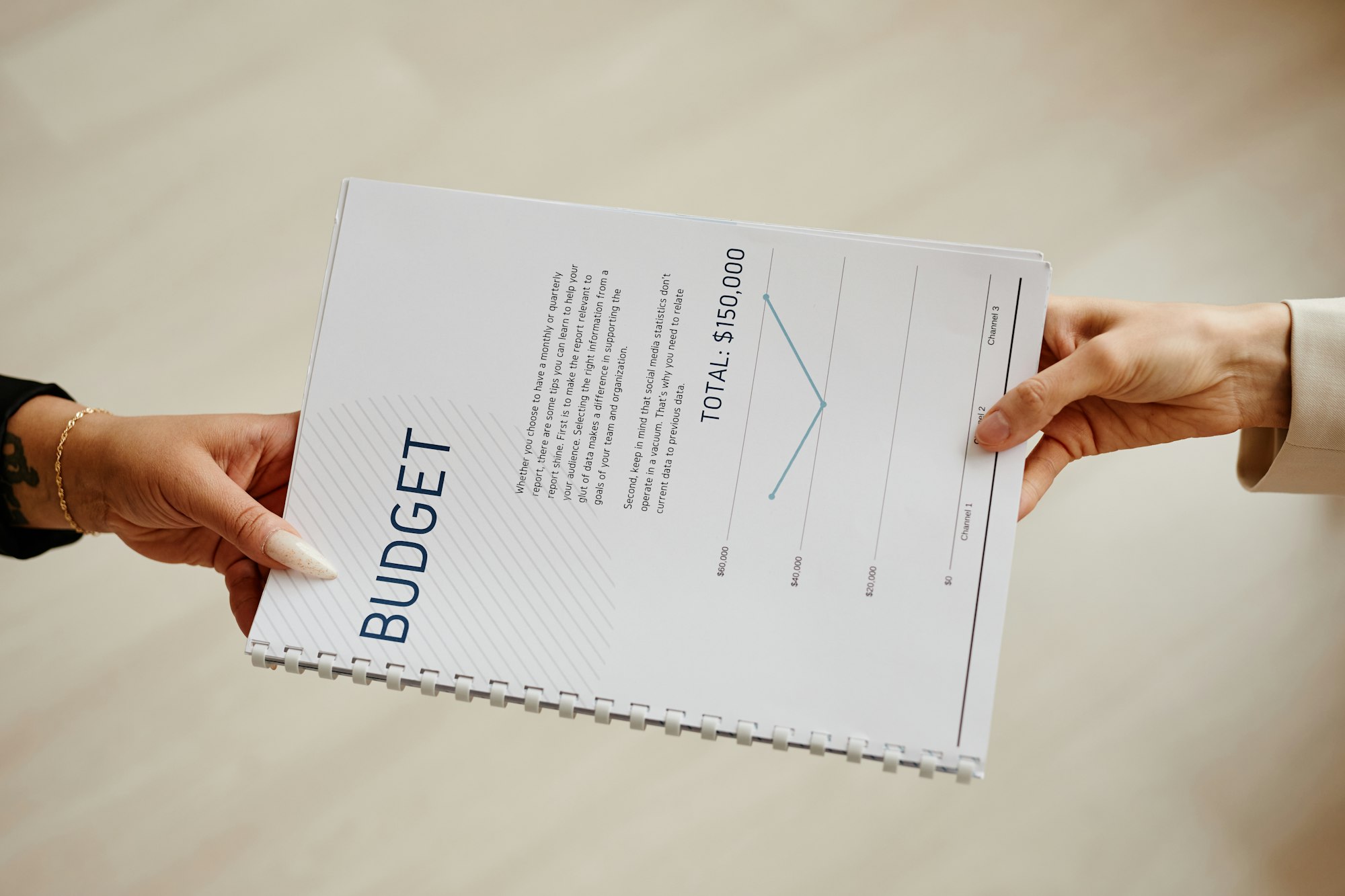
Negotiating project fees can often feel like walking a tightrope. You’re aiming to secure the best rate for your work while ensuring your client feels satisfied with the value they’re receiving.
This delicate balance is essential for maintaining both your profitability and your professional relationships. But don’t worry; mastering this skill is not as daunting as it seems. With the right strategies and a bit of practice, you can find the sweet spot that works for both parties.
“The art of negotiation is largely about finding mutually beneficial solutions, where both sides walk away feeling they’ve gained something valuable.” – Leigh Steinberg
In the following sections, we’ll delve into proven strategies for negotiating project fees, covering everything from the initial pitch to sealing the deal.

Your value is the cornerstone of any successful fee negotiation. To articulate your worth effectively, start by assessing your unique skills, experiences, and qualifications.
Ask yourself: What do you bring to the table that sets you apart? Your expertise, industry knowledge, and past successes form a compelling narrative that justifies your proposed fees.
Moreover, understanding your value isn’t just about self-assessment. It’s also about market research. Investigate the current industry standards for similar roles or projects.
Knowing these benchmarks helps you position yourself appropriately and ensures your expectations are aligned with what the market can bear.
Remember, confidence stems from clarity. When you have a clear grasp of your value, you can communicate it persuasively to your clients. This clarity helps you stay firm and composed, even when faced with pushback or counteroffers.
Lastly, tailor your pitch to the specific needs of the client. Demonstrate how your unique value directly addresses their challenges or goals.
This alignment not only underscores your relevance but also makes the client see you as an indispensable asset, justifying higher fees.
Negotiating project fees can be nerve-wracking, but it doesn’t have to be. Feeling confident in your negotiations starts with understanding and overcoming the common fears that hold many professionals back.
By addressing these challenges head-on, you can transform negotiations from a source of stress into an opportunity for growth and success. Let’s dive into how you can navigate these emotional barriers and approach your next negotiation with poise and assurance.

Stepping into a negotiation room can be daunting, but with the right approach, you can turn the tide in your favor. The key to successful negotiations is preparation and understanding your worth in the market.
By combining knowledge with tactical communication, you can secure project fees that reflect your expertise and contribution.
In this section, we dive into practical steps and proven techniques to help you navigate the negotiation process smoothly and confidently.
Know Your Worth: Before you start negotiating, do a market analysis to understand the standard rates for similar projects. Knowing your industry’s benchmark helps you set a realistic starting point.
Be Prepared: Have a clear idea of your bottom line and what you need to feel comfortable taking on the project. This preparation will guide your discussions and prevent you from settling for less.
Communicate Clearly: Articulate your value proposition succinctly. Show the client how your skills, experience, and approach can add value to their project.
Stay Professional: Keep negotiations respectful and professional. Even if the initial offer is lower than expected, maintain composure and counter with your reasons for the proposed fee.
Understand Their Budget: Don’t hesitate to ask about the client’s budget. This information can help you tailor your proposal to better meet their financial constraints while still getting a fair fee.
Be Flexible: Sometimes, flexibility in the fee structure or payment terms can make a deal possible. For long-term projects, you might offer a discount or a payment plan.
Offer Alternatives: If the client is hesitant about your rate, propose alternative solutions like phased payments, milestone-based billing, or adjusted project scope.
Highlight Results: Use past success stories and case studies to illustrate the kind of results they can expect, substantiating why your fee is justified.
Close the Deal: Once you reach a mutually agreeable fee, ensure everything is documented in a clear contract. This contract should detail the scope of work, payment schedule, and any other agreed terms.
Preparing for a fee negotiation meeting might seem daunting, but it’s crucial for achieving a satisfactory outcome. Start by doing your homework: research your market value, collect data on industry standards, and understand the client’s budget.
Have a clear breakdown of your costs, benefits, and the unique value you bring to the project. This preparation not only boosts your confidence but also provides solid evidence to support your proposed rates.
Next, rehearse your key points and potential counters. Anticipate possible objections the client might raise and prepare responses.
This will help you stay calm and composed during the actual conversation. Additionally, establish your walk-away point—knowing your limits ensures you don’t undersell yourself.
Finally, make sure to approach the meeting with a collaborative mindset. You and your client both want the project to succeed, so frame the negotiation as a partnership rather than a battle. By showing understanding and flexibility, you’re more likely to find a mutually beneficial agreement
Negotiating project rates can be a delicate process, and there are several mistakes you’ll want to steer clear of. First, never undervalue your worth.
Accepting a lower rate than you deserve can lead to feeling undervalued and overworked, which can affect your performance and overall job satisfaction.
Additionally, not having a clear understanding of your minimum acceptable rate can leave you vulnerable to agreeing to terms that don’t meet your financial needs.
Another common misstep is failing to do adequate research beforehand. Knowing the industry standard rates and understanding the client’s budget constraints can provide a strong foundation for your negotiations.
Similarly, neglecting to discuss the project scope in detail can lead to disagreements or unexpected workloads later on. Always clarify what is included in your fee to avoid scope creep.
Lastly, being inflexible during negotiations can be a major pitfall. While it’s important to know your value, it’s equally crucial to establish and maintain positive client relationships.
Being open to alternative solutions, such as negotiating on project scope instead of price, can help you reach a satisfactory agreement without diminishing your worth.
Confidence in negotiating project rates often stems from thorough preparation and a solid understanding of your value. Start by doing your research; know the going rates for project managers in your industry and region.
This knowledge provides a benchmark and arms you with evidence to back your proposed fees. Additionally, set a minimum acceptable rate for yourself. This not only ensures you’re compensated fairly but also gives you a clear boundary for negotiations, making it easier to walk away if necessary.
Practice makes perfect. Rehearse your negotiation pitch to refine your approach and reduce anxiety. Role-playing with a trusted colleague or mentor can help you anticipate potential client objections and prepare effective responses.
Remember, maintaining a positive, assertive attitude is crucial. Speak confidently about your experience and the value you bring to the project, ensuring the client understands why your rate is justified. Valuing your work convincingly communicates your worth to potential clients.
Lastly, be open to compromise. Flexibility can lead to mutually beneficial agreements. For instance, if a client is hesitant about your fees, consider proposing different payment structures or additional services that add value without reducing your rate.
This not only demonstrates your willingness to find solutions but also reinforces the professional value you bring to the table.
If a client rejects your proposed project fee, stay calm and consider it a normal part of the negotiation process. Here are steps you can follow:
Remember, the goal is to find a win-win situation where both you and the client feel satisfied with the agreement.
Absolutely, there are unique strategies tailored to different industries. For example, in construction, project managers might emphasize their experience handling similar projects successfully and focus on the tangible results of their past work.
They should also be ready to discuss the specific challenges and how their expertise can mitigate risks, as construction projects often deal with unforeseen complications. Flexibility in fee structure, such as offering discounts for longer contracts or phased billing, can also be appealing.
On the other hand, freelancers in creative fields might highlight their unique style and past portfolio to justify their rates.
Demonstrating how their work can align with the client’s vision or enhance the client’s brand image can be potent negotiation tools. Additionally, offering bundled services or retainer agreements can present additional value to clients.
In the tech industry, where projects often evolve rapidly, emphasizing your expertise in cutting-edge technologies and your ability to adapt to changes can be crucial.
Tech professionals might also consider offering proof of their successful track record through case studies or client testimonials, which can substantiate their fee proposals.
Tailoring your approach based on industry-specific needs and demonstrating how your skills and experience meet those needs is key to successful negotiations.
Successful fee negotiation is more of an art than a science. By understanding your value, approaching each negotiation with confidence, and employing effective strategies, you can ensure you are fairly compensated for your work.
Remember, preparation is key; the more data and knowledge you have, the better positioned you will be to advocate for the fees you deserve.
Don’t be afraid to ask for what you’re worth. With these proven strategies, you can navigate fee negotiations with greater ease and success. Every interaction is a learning opportunity, so keep refining your approach and building on your experiences.
Ultimately, the goal is to reach an agreement that satisfies both you and your client, laying the foundation for a productive and profitable relationship. So, go forth and negotiate with confidence!



